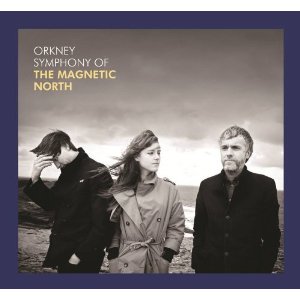In the 1932 travelogue that gave this album its title – Orkney The Magnetic North – J. Gunn writes of this group of islands to the north of Scotland, "Orkney has hitherto refused to be discovered". If, he says, "the tired city man longs for the peace and quiet of the Islands, he finds it difficult to obtain reliable information as to where Orkney is, what sort of place it is, and how it can be reached". Eighty years later, we are overwhelmed by travel information – tourist websites and interactive maps and flight details – but this record approaches Orkney in the same way as Gunn: with a sense of wonder, as if discovering it all for the first time.
Main songwriter and singer Erland Cooper was born and brought up in Orkney, and says he was visited in a dream and told to make a record about his home islands. His bandmates Hannah Peel and Simon Tong, meanwhile, are from the north of England. All three immersed themselves in Orcadian history and folklore when writing and recording the record, resulting in a piece that benefits from both the knowledge and veracity of a local and the fresh eyes of incomers.
Cooper previously released music with Erland and the Carnival, reworking folk songs disrespectfully, while Tong is previously of The Verve and The Good, the Bad and the Queen. Cooper’s voice does recall Damon Albarn at his most crooning but also has the Isles accents – a softer Celtic lilt than that of mainland Scotland – breaking through.
Cooper conceived Symphony Of… as a record to listen to while travelling north to Orkney and the songs are named after places, mainly landmarks surrounding the harbour town of Stromness where he grew up. This is an effective strategy which roots the music in geography yet is also potentially dangerous: before you press play, there are images, associations – the album meaning more to someone who knows the islands. But places are given new angles: ‘Old Man of Hoy’, named after a colossal rock sea stack, becomes an elderly gent remembering "life times never go the way you choose / feels like they run away from you".
Just as the accents of the island peoples reflect their surroundings – rolling cadences like soft hills – the landscape affects the sound and attitude of the music. Three times a day, Northlink ferry MV Hamnavoe arrives from Scrabster and, in opening track Stromness, a trombone emulates the sound of the ship’s horn coming into harbour, a defining characteristic of the town. The first of three songs named after Orkney beaches, ‘Bay of Skaill’, has a spare arrangement like a deserted beach, with a solitary figure walking across in a melody. A single note sustains – as if carried in the wind, and the driving rhythm is the ocean relentlessly arriving on the shore.
Throughout the album, there are complex arrangements taking in instrumentation from organ riffs to strings to appearances from the Stromabank Pub Choir, an eccentric group from the island of Hoy, yet it maintain a lightness of touch: extremely competent work by Peel. This is evident throughout: recorded last year partly in Orkney (including at Cooper’s parents’ house) there’s terrific unity to the project, outlined as if by the line of the shore on a map.
Rackwick, a bay and valley on Hoy and arguably the most beautiful place in Orkney, makes for the most beautiful song. The plaintive chorus of "I need somebody / someone to hold me / just like I want to / Just like you used to" sounds simple but affecting, with a repeated zooming of scale: from the hugeness of the natural world to the closely personal. The album is dedicated to Betty Corrigall, a young woman who, pregnant out of wedlock, committed suicide and was buried on the moor, and the song named after her is perhaps from her viewpoint: "I will always let you down, whether I mean to or not".
In ‘Netherton’s Teeth’, with lyrics adapted from Brothers by Orkney poet Edwin Muir, Cooper and Peel’s voices work together in a delicate duet. ‘Ward Hill’, using words from Gunn’s travelogue about "hands as well as feet are used to reach the top", looms darkly like its namesake, the highest hill in the Orkney, and there is an odd and intriguing adjunct on the song: "Papa Westray / there you’ll find me / another lonely isle".
These are timeless songs which rather than being of any genre – not even the hard-to-define ‘folk’ – seem to spring from the bare open horizons, low-lying islands and sea of Orkney, creating a unique bleak and windswept aesthetic.
Cooper has lived "south" (As Orcadians call anywhere else) for over a decade but it can take going away and returning to appreciate what is special about where you’re from. Accusations of romanticisation, or presenting the islands as remote and ‘other’ could be levelled at him but living on a godforsaken rock where the North Sea meets the Atlantic needs its own poetry to be bearable. Lawrence Durrell coined the term ‘islomania’ to describe "a rare but by no means unknown affliction of the spirit" where people "find islands somehow irresistible". This record is both symphony for sufferers of that condition and a treasure map to the Orkney Islands, whether walking their beaches, or stopped in a traffic jam on the M25.


